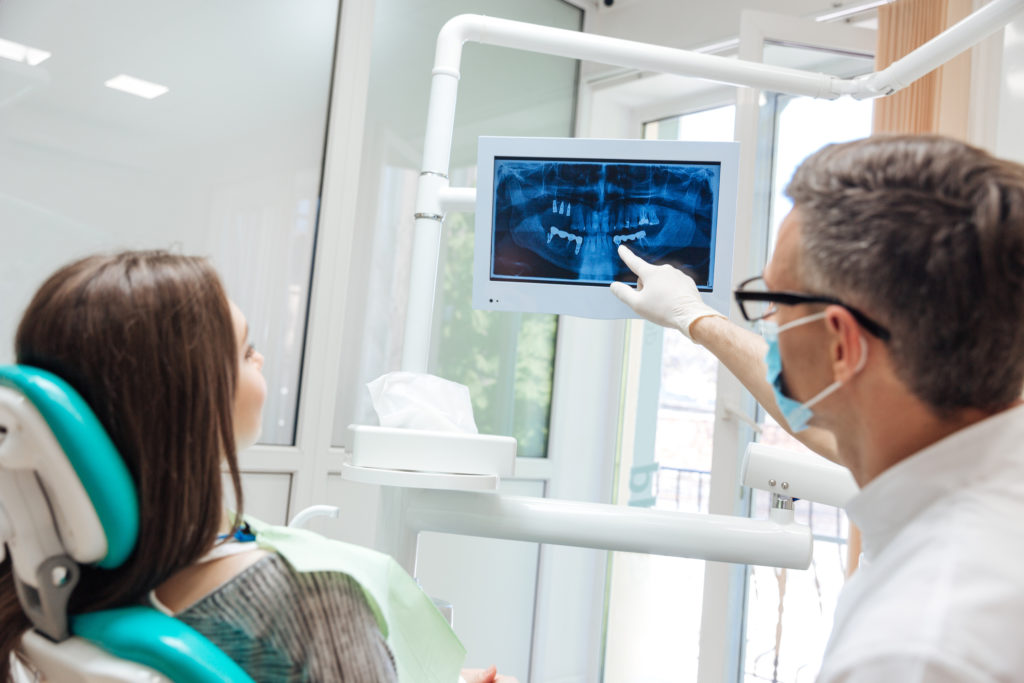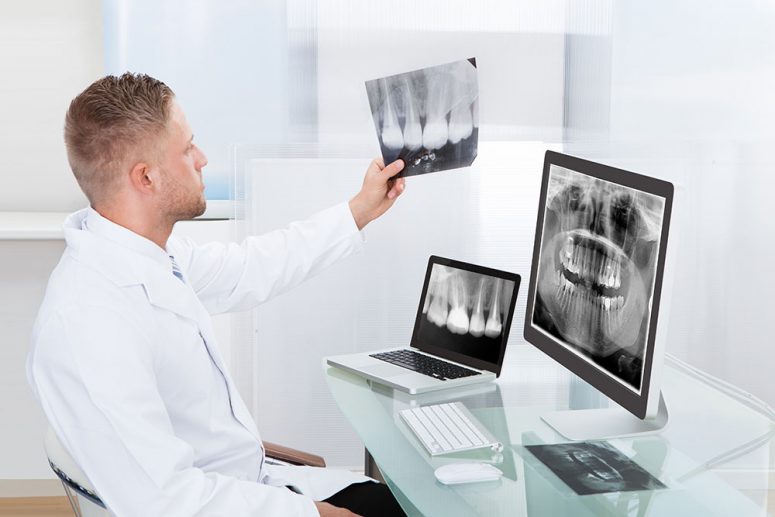Dental X-Rays
Dental x-rays help our dentists see diseases of the tissues and teeth that can’t be detected with a cursory oral exam.
Additionally, dental x-rays help dentists detect and treat problems early on, which can save patients’ money and possibly their lives. Read on to learn more about the x-ray services we provide.
Problems Dental X-Rays May Detect
In otherwise healthy adults, dental x-rays may:
- Point out decaying areas that may not be seen during an oral exam, especially areas hidden between the teeth
- Find decay that exists beneath fillings
- Show the bone loss that typically accompanies advanced gum disease
- Reveal infection-related changes in the root canal or bone
- Help in the creation of braces, dentures, and implants
- Show an abscess, or infection between the teeth and gums
- Reveal other abnormalities such as tumors and cysts
In younger patients, x-rays may:
- Help the dentist monitor tooth decay
- Determine whether there’s enough room in the child’s mouth for incoming teeth
- Assess whether primary or baby teeth are coming out quickly enough to allow secondary (permanent) teeth to come in normally
- Check for wisdom tooth development and determine whether there’s an impaction (an inability for the tooth to come through the gums)
Call us to schedule a consultation with a local dentist who can explain the benefits of diagnostic dental x-rays.
The Smile Gallery Patient Reviews
How Often Do Patients Need X-Rays?
The frequency with which a patient may need x-rays depends largely on his or her current condition, medical history, and dental history. Some patients may need x-rays twice per year; others with no gum disease and who visit the dentist often may only need them every few years. New patients may get x-rays as part of a preliminary exam and to set a baseline from which the dentist can draw comparisons over time. Our dentists follow these general guidelines on x-rays:
- Children whose first permanent teeth haven’t grown in: They should receive x-rays if teeth touch and the dentist can’t see all surfaces. If decay is present and the child is receiving treatment, they should get x-rays every six months until the decay disappears. X-rays to assess development and growth are typically not indicated in patients of this age.
- Adolescents whose wisdom teeth haven’t erupted: Full x-rays are indicated when a child has a history of tooth decay or plain evidence of a dental disease. X-rays should be taken every 6-12 months until decay disappears, and they should also be taken to check for the emergence of wisdom teeth.


- Adults with permanent teeth: A full x-ray series is recommended when an adult patient has a history of tooth decay or evidence of a dental disease. From there, x-rays are taken every year to 18 months until the decay is resolved. X-rays for the purpose of assessing development and growth typically aren’t indicated.
- Adults with no teeth: X-rays are not usually recommended unless the dentist has determined the clinical presence of a specific oral condition.
Schedule a consultation with one of our dentists, who can create a customized treatment program that includes x-rays and other procedures.
The High-Risk Category
Patients who fall into a high-risk category and may need more frequently dental x-rays include those groups listed below.
- Children: Young patients typically need x-rays more often than adults do because their jaws and teeth are still growing. Because of this, decay may reach the dentin (the innermost part of the tooth) sooner and spread more quickly.
- Adults with complex restorative work: These patients should receive frequent x-rays, so the dentist can detect decay beneath fillings or in different locations.
- Those who consume a large quantity of sugary drinks: They need x-rays more often because the sugar-rich environment is ideal for the development of cavities.
- People with gum (periodontal) disease: X-rays are indicated more frequently, so the dentist can monitor the rate of bone loss.
- Patients with dry mouth or xerostomia: Whether it’s due to an antidepressant, anti-anxiety medicine, antihistamine, or other medicine, damage to the salivary glands, Sjögren’s syndrome, or radiation treatments to the neck or head, dry mouth can lead to cavity development. In these cases, frequent x-rays are indicated.
- Smokers: A person who smokes is at greater risk of gum disease and tooth loss. This group of patients should get x-rays more often, so our dentists can monitor the rate of periodontal disease-related bone loss.
The Safety of Dental X-Rays
Exposure to various radiation sources, such as soil-borne minerals, home appliances, the sun, and x-rays, can damage tissues and cells throughout the body. In extreme cases, exposure may lead to the growth of some forms of cancer. Thankfully, the dosage of radiation a patient is exposed to during dental x-rays is miniscule, particularly if the dentist uses digital x-rays.
Recent technological advances have led to methods by which dental x-ray related risk is reduced. However, even as these advancements occur, radiation’s effects are cumulative over a person’s life. Every exposure counts, and the less radiation a person receives, the safer they are.
If a patient is concerned about the radiation exposure that comes with dental x-rays, they can talk to the dentist about how often the procedure is necessary and why the x-rays are being taken. As discussed previously, some groups of patients need more frequent x-rays, but current dental guidelines require that they be given only when necessary for an accurate clinical diagnosis.
Schedule a Checkup and X-Rays Today
Modern dental x-rays are an extremely useful diagnostic tool that helps dentists detect disease and damage that isn’t seen during a conventional dental exam. The frequency with which a patient receives x-rays depends largely on their age, current oral health, their risk of certain conditions, and existing symptoms and signs of disease. No matter which of the above groups a patient falls into, they can count on the entire team at our office to provide the quality, professional care they need and deserve. One of our dentists will review the patient’s history, examine his or her mouth, and decide whether x-rays are necessary. Call the office or book an appointment online today.

Our Promise to You
The Smile Gallery practices the Art of Fine Dentistry. We work to ensure our patients have the most relaxed and comfortable experience possible. Our individualized patient attention means you receive the best care possible. Our friendly staff is ready to greet you warmly, set you at ease, and create a level of comfort and customer service rarely seen in the dental industry.
We understand patients who have dental anxiety and have been working for years to provide the safe, comfortable environment that makes you want to see your Escondido dentist a few times a year or anytime your teeth need dental services.
